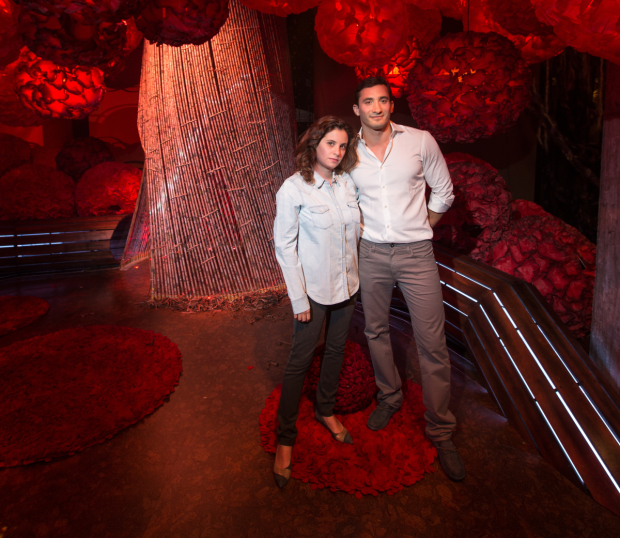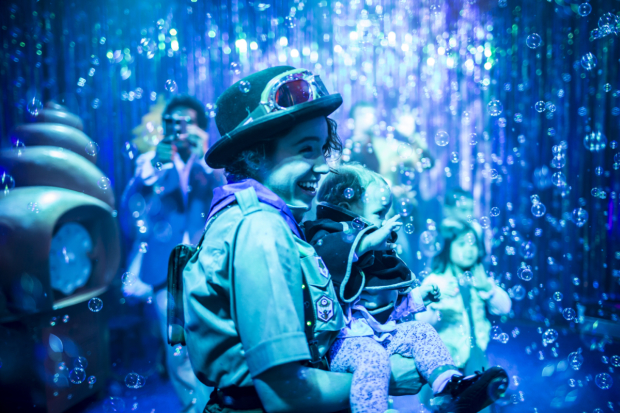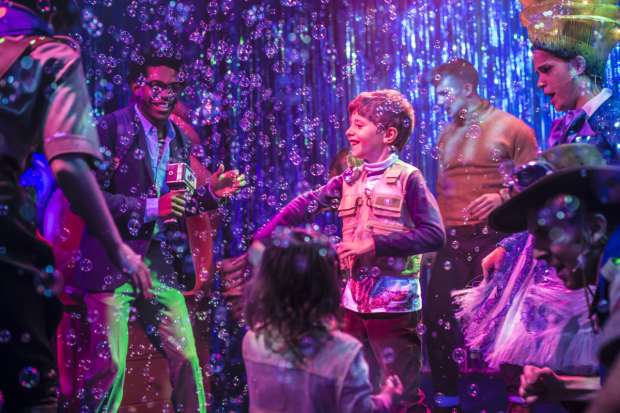Young Explorers Roam Around Pip's Island in the Ajami Siblings' Immersive Adventure
The innovative production breaks new ground in children’s entertainment…but don’t call it “theater.”
"It's very hard to explain what this is," says Rania Ajami, cocreator of Pip's Island alongside her brother and business partner Rami. If pushed, you could nudge it under the umbrella of "children's theater," but the Ajami siblings have specifically set out to subvert that very genre. "We don't actually use the word 'theater' to describe it," Rania explains. "We say 'immersive adventure' — because it goes beyond theater."
Like Sleep No More blended with a live video game, young "explorers" are guided from room to room at New York's Skylight Modern to complete challenges that earn them "sparks" — the energy sources they'll need to defeat the story's villain. Meeting and interacting with various characters along the way, the children are immersed in 360-degree environments, enhanced by music, lighting, digital graphics, and animation while also taking charge of the narrative as their parents (or "assistant explorers") hang back and let them at their adventure.
The Ajamis are new to the world of children's entertainment — Rami with a background in finance and Rania with two film-directing credits under her belt, including a documentary about Libyan dictator Muammar Qaddafi's female bodyguards. Yet, however unorthodox, her talent for storytelling, his penchant for business, and their common desire to create a safe space for children to play and be challenged may just be the right ingredients for a game-changing experience for kids .

(photo courtesy of Pip's Island)
What inspired the idea to create Pip's Island? Did either of you ever expect to start a children's entertainment company?
Rania: No, I thought I would be making movies for grownups. I directed a couple of movies before this…And then I had kids and started going around and seeing there really is a vacuum in the market. That kind of brought to life this idea of immersive adventures that at the same time has a rich digital storytelling component.
Rami: I was in investment banking and private equity working on mining projects in Africa and I got to a stage where I wasn't enjoying it. I wanted to do something entrepreneurial — that actually gives back a little bit. Rania was very much in this creative space so we teamed up and spent a lot of time thinking about where we think the industry's going.
What was missing from the shows you would bring your kids to, Rania?
Rania: Nothing was really wow or wondrous ¬— that's fun for parents as well, that brings together all the different artistic mediums. We've spent three years building the content, the mythology, the island, the characters, the animation — so there are those components that we're merging together.
Rami: There's this trend of immersive experiences — mainly for adults but some kids stuff. While they claimed they were immersive, the ones we went to were only immersive in the sense that you're walking through spaces, but you're very much a passenger. There are actors talking to you but then you just shuffle on through. We felt that we should try to create something that we think is genuinely immersive in the sense that the kids are actively getting involved and shaping the story. Our bigger-picture plans are to have shows where kids could make decisions and go down different routes. So that's where we think the business could go.

(© Thom Kaine)
What else do you see for the future of this company?
Rami: We're looking to have a graphic mobile animated series, online games: The concept is the kids come to the show, they dive into it, they love the characters, and then they can continue that experience through these different mediums. It's interesting because when we started as a business and we were pitching this concept, we got a lot of people resisting saying, "It's not gonna work. Why would anyone come to a show where the property is completely unknown? You have to start off as a famous cartoon show and then the kids love the cartoon and they want to go to the show." That's not true. Kids are thirsty for live experiences and parents are hungry to take them. Kids — their minds are sponges. It's easy for them to go to a show and totally delve into the world. We have so many people saying, "We want to learn more." So we sort of flipped the model on its head.
Why was this a project both of you felt passionate about?
Rami: We love kids. We think it's important for children in that formative time to be nurtured. I don't have kids but I see the pressure that kids even from the age of two or three are put under. If you don't get into the right preschool, you're not going to go to the right Ivy League university and you're going to be a failure for the rest of your life. It's unhealthy for kids' development. There are studies out there that have found that kids shouldn't even be in any sort of formal education until the age of eight. The only thing they should be doing in the early years is play and be creative. We obviously want to be successful, but at the same time it's not just about making money. We feel we are going to impact people's lives in a positive way.
Rania: We really feel it enriches children but isn't "educational" in that kind of classic curriculum way. It's educational for how to live your life, how to use your own powers to overcome certain obstacles. You see it on a small scale. Some children get a little bit scared at the beginning, and the sense of pride when they come out, they're like, "I did it! I actually made it through!" Just to see that joy when they come out — it's amazing.
Is that kind of challenging experience something that's also unique to Pips' Island?
Rania: That's our motto of the whole brand. We don't try and dumb it down. We have them hold onto a mythology, a world, characters' names, a storyline, and at the same time figure things out. It's not making it easy for them. They work for a reward because then they feel more empowered. They learn how to connect with one another, they learn teamwork, they learn about using their creativity, they learn about investigating their environment. It's like a life experience but on a mini scale. There aren't many opportunities to just play and be imaginative and be in a free space. I think that's what we're bringing to children — in a very unique way.

(© Thom Kaine)







